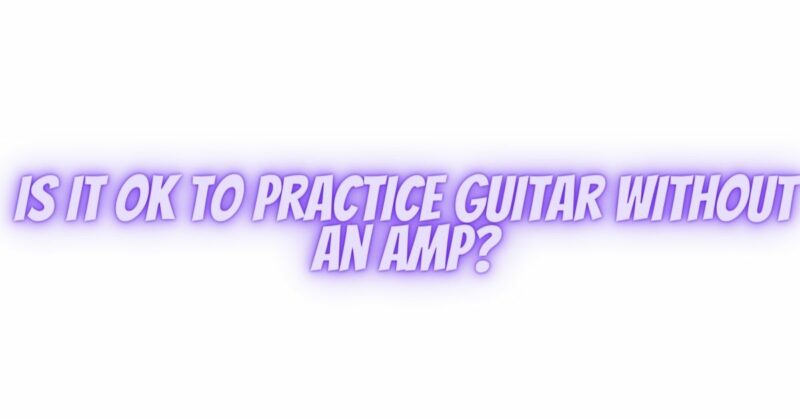Practicing guitar without an amplifier is not only acceptable but also a common and valuable part of a guitarist’s journey. While amplifiers are essential for live performances and specific practice scenarios, practicing without an amp has several advantages, especially for beginners and those looking to refine their skills. In this article, we’ll explore the benefits of practicing guitar without an amplifier and when it might be most beneficial.
Advantages of Practicing Without an Amp:
1. Silent Practice:
- Practicing without an amp allows you to play silently, making it an ideal option when you need to practice without disturbing others, such as in shared living spaces, apartments, or late at night.
2. Focus on Fundamentals:
- Playing unplugged helps you concentrate on fundamental aspects of guitar playing, including finger placement, fretting accuracy, picking technique, and hand synchronization.
3. Ear Training:
- When practicing without amplification, you can focus on developing your ear and improving your ability to recognize notes, chords, and intervals by sound alone.
4. Acoustic Guitar Skills:
- If you transition between electric and acoustic guitars, practicing unplugged can help you build and maintain your skills on both types of instruments.
5. Portable and Convenient:
- Practicing without an amp is highly portable and convenient. You can take your guitar anywhere and practice anytime without the need for additional equipment.
6. Songwriting and Composition:
- When working on songwriting, chord progressions, or composing, practicing without an amp allows you to focus solely on the music and the creative process.
7. Technical Exercises:
- Many technical exercises, such as scales, arpeggios, and legato exercises, can be effectively practiced without amplification.
When to Use an Amplifier for Practice:
While practicing without an amplifier offers numerous benefits, there are situations where using an amp becomes more appropriate:
1. Tone Exploration:
- Amplifiers are essential when you want to explore different tones, effects, and settings. Experimenting with your amp helps you find the right sound for various musical styles.
2. Performance Practice:
- If you plan to perform live or with other musicians, it’s crucial to practice with an amplifier to get used to the amplified sound and to ensure your guitar’s volume matches the context.
3. Feedback and Dynamics:
- Amplifiers provide the opportunity to work on dynamics, feedback control, and playing at different volumes, which are important for live performance.
4. Recording and Sound Development:
- When recording your music, using an amplifier is essential to capture your desired guitar tones. Amps play a significant role in shaping your sound in a studio setting.
5. Stage Presence:
- Practicing with an amp helps you develop stage presence and a sense of how to interact with your equipment during live performances.
Conclusion:
Practicing guitar without an amplifier is not only acceptable but also highly beneficial for various aspects of your playing. It allows you to focus on technique, ear training, and silent practice, making it an integral part of your practice routine. However, incorporating amplifier practice when necessary is essential for honing your live performance skills, exploring different tones, and preparing for recording sessions. Ultimately, the balance between practicing with and without an amp depends on your goals as a guitarist and the context in which you intend to play.


